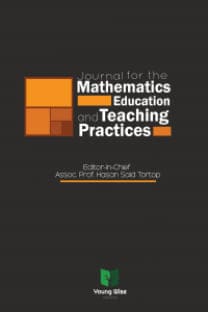Large scale Open Educational Resources (OER) initiative in mathematics
Large scale Open Educational Resources (OER) initiative in mathematics
Learning Equity, Open Educational Resource, Community College,
___
- Association of Community Colleges Trustees. (ACCT) (2015). Diversity, Equity & Inclusion: A checklist and implementation guide for community college boards. ashington, DC. https://files.eric.ed.gov/fulltext/ED611029.
- Belkharraz Idrissi, A., Cuellar, M., Funk, J., (2020). Co-Requisite Mathematics Models and Gateway Completion. Strong Start to Finish. https://strongstart.org/sites/default/files/resource- center/pdfs/SSTF-StepsToSuccess-LaGuardia%20FINAL.pdf
- Buabeng-Andoh, C. (2012). Factors influencing teachers’ adoption and integration of information and communication technology into teaching: A review of the literature. International Journal of Education and Development using Information and Communication Technology, 8(1), 136- 155. DOI:10.1080/14759390000200096
- Butcher, N. (2015). A basic guide to open educational resources (OER). British Columbia, Canada: Commonwealth of Learning, Vancouver and UNESCO. http://oasis.col.org/handle/11599/36
- Clinton-Lisell, V., Legerski, E., Rhodes, B., & Gilpin, S. (2020). Open Educational Resources as tools to foster equity. In C. Ozaki & L. Parson (Eds.) Teaching & learning for social justice and equity in higher education, Volume 2. Palgrave MacMillan.
- Clinton, V., & Khan, S. (2019). Efficacy of open textbook adoption on learning performance and course withdrawal rates: A meta-analysis. AERA Open, 5(3), 1-20. https://doi.org/10.1177%2F2332858419872212
- Comforto, N. (2015). The teacher’s guide to Open Educational Resources. Retrieved from http://www.edudemic.com/guide-open-educational-resources.
- Conole, G., & Brown, M. (2018). Reflecting on the Impact of the Open Education Movement. Journal of Learning for Development, 5(3), 187-203. DeCarlo, M. P. (2019, November 7). Teaching note: Creating open textbooks for social work education.
- Doody, O., & Doody, C. M. (2015). Conducting a pilot study: Case study of a novice researcher. British Journal of Nursing, 24(21), 1074-1078.
- Forbes, C. T. (2013). Curriculum-dependent and curriculum-independent factors in preservice elementary teachers’ adaptation of science curriculum materials for inquiry-based science. Journal of Science Teacher Education, 24(1), 179-197. https://doi.org/10.1007/s10972-011-9245-0
- Grodecka, K., & Śliwowski, K. (2014). Open Educational resources mythbusting. Retrieved from http://mythbusting.oerpolicy.eu/wp-content/uploads/2014/11/ OER_Mythbusting.pdf. Licensed under a Creative Commons Attribution 4.0 International license.
- Hall, M., Smith, K., Boeckman, D., Ramachandran, V., & Jasin, J. (2003, October). Why do students withdraw from courses? Southern Association for Institutional Research, 01-11. San Antonio, TX.
- Hilton, J. (2016). Open educational resources and college textbook choices: A review of research on efficacy and perceptions. Educational Technology Research and Development,64(4), 573–590.
- Jenkins, J. J., Sánchez, L. A., Schraedley, M. A. K., Hannans, J., Navick, N., & Young, J. (2020). Textbook broke: Textbook affordability as a social justice issue. Journal of Interactive Media in Education. https://doi.org/10.5334/jime.549.
- LaGuardia Community College Office of Institutional Research and Advancement. 2019 Institutional Profile. Retrieved from https://www.laguardia.edu/uploadedFiles/Main_Site/Content/IT/2019-Institutional- Profile.pdf
- Lambert, S. R. (2018). Changing our (Dis)Course: A Distinctive Social Justice Aligned Definition of Open Education. Journal of Learning for Development, 5(3), 225–244. https://orcid.org/0000-0003-2722-9684
- Prescott, P. A., & Soeken, K. L. (1989). The potential uses of pilot work. Nursing Research, 38(1), 60.
- OECD (2016), Innovating Education and Educating for Innovation: The Power of Digital Technologies and Skills, OECD Publishing, Paris. http://dx.doi.org/10.1787/9789264265097-en
- Remillard, J. T. (2005). Examining key concepts in research on teachers’ use of mathematics curricula. Review of Educational Research, 75(2), 211–246. https://doi.org/10.3102%2F00346543075002211
- Sullivan, J. (2011). Free, Open-Source Software Advocacy as a Social Justice Movement: The Expansion of F/OSS Movement Discourse in the 21st Century. Journal of Information Technology & Politics, 8(3), 223–239. https://doi.org/10.1080/19331681.2011.592080
- U.S. Public Interest Research Group Education Fund and Student Public Interest Research Groups. (USPIRG) (2014). Fixing the Broken Textbook Market. Washington, DC. http://www.uspirg.org/reports/usp/fixing-brokentextbook-market
- Watson, C. E., Domizi, D. P., & Clouser, S. A. (2017). Student and Faculty Perceptions of OpenStax in High Enrollment Courses. The International Review of Research in Open and Distributed Learning, 18(5). https://doi.org/10.19173/irrodl.v18i5.2462
- Wiley, D. & Hilton, JL, III. 2018. Defining OER-Enabled Pedagogy. The International Review of Research in Open and Distributed Learning, 19(4). https://doi.org/10.19173/irrodl.v19i4.3601
- Wiley, D., & Green, C. (2012). Why openness in education? In D. Oblinger (Ed.), Game changers: Education and information technologies, pp. 81-90. N.p.: Educause. Retrieved from https://net.educause.edu/ir/library/pdf/pub7203.pdf.
- Yayın Aralığı: Yılda 2 Sayı
- Başlangıç: 2020
- Yayıncı: Genç Bilge Yayıncılık
Mathematics textbooks content development at the primary stage: a proposed vision
Ibrahim KHALİL, Mohamed ALNATHEER
Sema NACAR, Esra MACİT, Bilal ALTAY
The effect of the collaborative learning technique on students ’educational performance in math
Large scale Open Educational Resources (OER) initiative in mathematics
